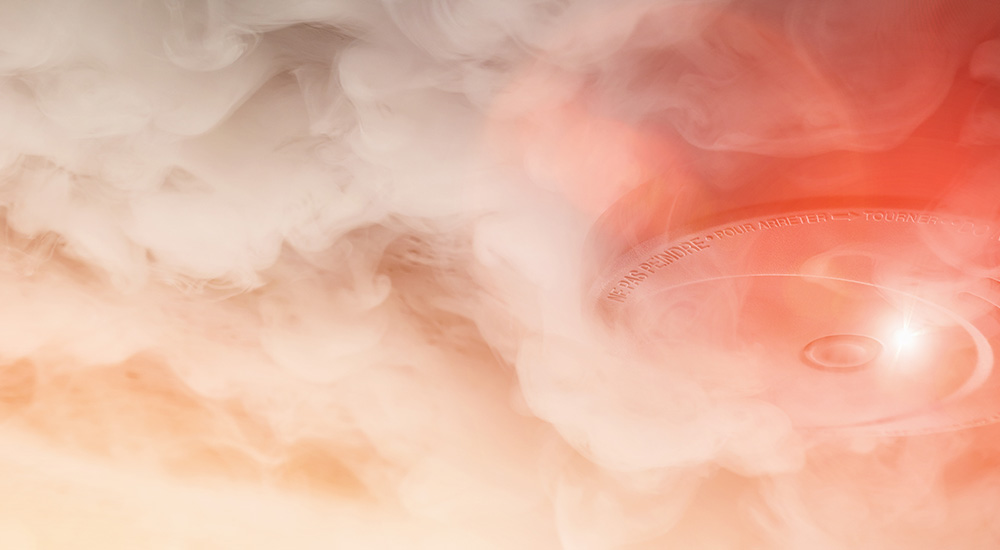Every 30 minutes, someone reports a home fire to the Canadian fire department. Chances are that you won’t experience a devastating home fire, but it’s still best to be prepared. If you fortify your house and teach your children about the dangers of a home fire, you’ll feel confident in the face of a fire.
Prepare Your Home
Your home should be fire ready at all times. The first step is to install smoke detectors on every floor. Place them where fires are more likely, such as near kitchens and fireplaces.
Make sure you replace the batteries twice a year, and check that each smoke detector is working at least once a month by pressing and holding the detector’s test button. Make sure the sound is loud and shrill enough to wake you up at night.
You should also keep a fire extinguisher near the kitchen and anywhere else particularly prone to fires.
Finally, secure important belongings in a fireproof safe. That way, they will stay intact if a fire occurs. The most important things to include are:
- Insurance policies and contact information
- Passports and birth certificates of all family members
- CD or drive with copies of family photos
- Legal documents, including wills
- Information on family doctors and prescription medications
- Family members’ social insurance numbers (SINs)
- Keys to your bank deposit box, if you have one
- Important papers regarding investments, retirement plans, bank accounts, etc.
- An inventory of your home belongings (written or videoed) for insurance claims
- Heirlooms, jewellery or cash
Prepare Your Children
Although you may keep your cool in a fire, your children probably won’t know what to do unless they practise first. Thus, it’s a good idea to hold a family meeting to plan a fire escape route. Choose a location for everyone to gather if a fire occurs, and practise your escape route regularly.
Also, teach your kids what to do in case of a fire. Make sure they know:
- The number for the fire department
- How to escape through smoke by crawling on hands and knees
- How to stop, drop and roll if their clothing catches on fire
Teach your kids about the dangers of cigarettes, lighters and matches. Keep these items locked away.
Practise Fire Safety Techniques
Fires generally don’t come out of nowhere; usually, a human error or faulty appliance causes the blaze. To prevent fires, make sure you and your children practise fire safety techniques in every room of your house.
Kitchen
First of all, keep an eye on everything you cook. Don’t put something in the oven and then leave the house while it cooks.
Don’t use a microwave with a broken door or any other malfunctioning parts.
Did you know that one of the main causes of kitchen fires is something in your kitchen coming in contact with the hot stove? That’s why you should clean off all grease on your stove, and keep dish towels, pot holders, utensils and Tupperware® away from the stove.
Make sure there is nothing near the stove that your kids would be tempted to reach out and grab. Also, keep pot and pan handles to the side; if the handle is sticking out, your kids may grab it or someone may accidentally bump it and send the hot pan flying to the ground.
Don’t forget to keep your appliances away from wet areas to avoid any electrical kitchen fires.
Living Room
If you have a furnace or space heater, make sure nothing flammable comes near it. Inspect these devices regularly to make sure they’re functioning correctly. Don’t leave a space heater on if no one is in the room. This wastes energy and could lead to an unnoticed fire.
Similarly, fireplaces should be covered by a screen or glass. Don’t ever burn trash or paper in your fireplace or heating stove. Finally, don’t start your fireplace with gasoline.
Any Room
Electrical appliances are extremely useful but can also be dangerous. An overloaded extension cord is one common cause of house fires. Make sure you don’t use too many appliances on one extension cord; if the cord is hot to the touch, stop using it. Don’t run cords under carpet or rugs, and replace all loose or frayed cords.
If a lamp sputters or sparks, replace the light bulb or repair the lamp. If your home experiences an electrical problem – lights going out, flickering or making noise – call in an electrician immediately.
Don’t forget to cover all outlets with face plates!
Prevent Fire Damage
Taking the necessary steps to protect your home from fires is well worth the effort. It takes only a weekend to set up your fireproof safe, develop a family fire escape plan and check smoke detectors, but these steps are worth it if you want to protect your home and family.
Putting in the effort to prevent fire damage can greatly reduce the chance of a fire in your home. In the case of an accident, you will avoid the worst case scenarios if you and your family are prepared and if your belongings are safely stowed away in a fireproof safe.








